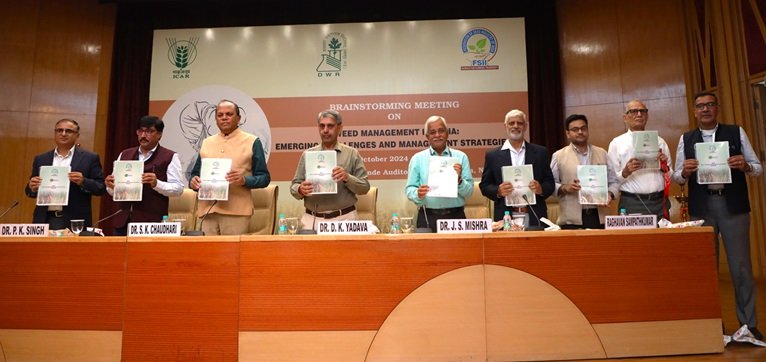Saturday, 14 February 2026

The study involved 11 states; 30 districts; 7 crops; and inputs from 3,200 farmers along with 300 dealers, KVKs, and departmental officials.
A collaborative study by Dr NT Yaduraju, Dr M R Hegde and Dr A R Sadananda and the Federation of Seed Industry of India (FSII) discussed the various weed management practices using herbicides, mechanization of weed removal, crop rotation, cover cropping, biological control among others that can lower costs by 40-60 per cent compared to traditional approaches. Experts said that it can be a game changer for farmers across India. With India’s population expected to reach 1.65 billion by 2050, effectively managing weed infestations will play an important role in boosting agricultural productivity and ensuring long-term food security.
The report was released on Friday at a joint conference by the Directorate of Weed Research and FSII titled ‘Weed Management – Emerging Challenges & Management Strategies’. The report, which surveyed 11 states, 30 districts, 7 crops, and gathered inputs from 3,200 farmers along with 300 dealers, KVKs, and departmental officials, revealed that the average expenditure on weed control per acre varies between Rs. 3,700 and Rs. 7,900. Beyond the issue of high costs, weeds are a leading contributor to crop losses among all biotic stresses, posing a serious threat to agricultural productivity.
According to research presented at the conference, weeds are responsible for approximately 25-26 per cent of yield losses in kharif crops and 18-25 per cent in rabi crops, translating to an annual economic loss of around Rs 92,202 crore in crop productivity across India.
Experts stressed on adoption of innovative solutions, such as mechanized weeding and herbicide tolerant crops, which can reduce labour costs by up to 72 per cent. With labour shortages affecting many regions, mechanized solutions and trait solutions have become not only practical but essential.
Experts at the conference informed that the report surveyed seven major crops including rice, wheat, maize, cotton, sugarcane, soybean, and mustard, that together account for 90.37 per cent of India’s total cropped area. The recommendations for each of these crops have the potential to be a gamechanger for farmers by significantly reducing weed management costs, boosting productivity, and preventing the development of herbicide resistance in weeds over the long term.
Dr S K Chaudhari, Deputy Director General, Natural Resource Management Division, ICAR, emphasised the critical need for the seed sector to stay vigilant and proactive in the field of weed science. He stated, “The collaboration between the private and public sectors is essential to effectively tackle the challenges posed by weeds. As agricultural productivity is increasingly hindered by labour shortages and resource constraints, adopting solutions like mechanization, herbicide-tolerant traits, and precision agriculture becomes imperative to empower farmers.”
Dr P K Singh, Commissioner, Ministry of Agriculture & Farmers Welfare, Government of India, speaking at the conference regarding potential damage and losses in productivity of various crops due to weed infestation, emphasized the critical need for a robust weed management framework involving traditional, mechanical, chemical and any other innovative solutions in the context of new cropping systems like DSR, Natural Farming, Organic Farming in the present climate change regime and labour constraints.
Ajai Rana, Chairman of FSII and CEO & MD of Savannah Seeds, also weighed in on the challenges saying, “Technological interventions like AI-driven weed detection, drone-based mapping, and data-backed IWM strategies can redefine weed management in India. With herbicide resistance and shifting weed biotypes posing serious threats, it’s imperative we adopt precision tools that offer real-time insights and elevate our weed control methods to the next level of efficiency and sustainability.”
Emphasizing the crucial role of Herbicide-Tolerant technology, especially in countries where adopting GM technology faces various challenges, Rana noted, “Developing HT crops for existing herbicides through mutation breeding is a promising strategy and alternative. HT crop technology offers cost effective control against hard-to-manage weeds and wild species competing with main crop. However, the success and long-term sustainability of this technology depend on integrating it with a comprehensive stewardship program. A robust outreach initiative involving all stakeholders, along with institutional collaboration and oversight, is essential to ensure the effective implementation and success of HT crop systems.”